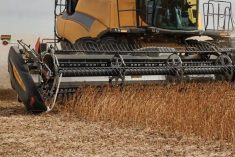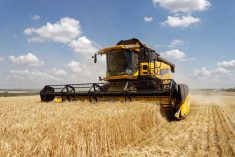Buenos Aires | Reuters – Argentine soymeal and soyoil factories went back into production on Wednesday after a 20-day strike by oilseed workers was ended late the night before by a new wage contract for the coming year, union and industry sources said.
The deal, following a more than 10-hour negotiation session hosted by the Labor Ministry on Tuesday, includes a two-part 25% increase in salaries from January to August. Increases for the rest of the year are to be determined by the inflation rate.
“We have reached an agreement in general terms and that for this reason the strike has ended,” said a statement issued on Wednesday by the SOEA oilseed workers’ union.
Read Also

U.S. grains: Corn sets contract lows on expectations for big US crop
Chicago Board of Trade corn futures set contract lows and soybean futures sagged on Friday on expectations that beneficial weather for U.S. crops will lead to bumper harvests, analysts said.
“Activities are normalizing as of the start of the first shift of today, and that work schedules at every plant are back to normal,” the union said in the statement.
Andres Alcaraz, spokesman for the CIARA chamber of soy crushing companies, confirmed that plants were back up and running.
Argentina’s oilseed workers’ federation said in a statement late Tuesday that the deal “means the triumph of the strike for a living wage that ensures a dignified life for each worker and their families.”
Chicago Board of Trade soybean futures had been affected by the work stoppage. Workers went on strike over wages that they said did not fully compensate them for Argentina’s high inflation rate and the risk of working during the COVID-19 pandemic. Argentina is a major corn, wheat and soybean supplier.
The strike had affected operations of international agro-giants such as Cargill Inc, Bunge Ltd and Louis Dreyfus Co, and sent soybean prices skyrocketing to six-year highs on the Chicago exchange.
The Urgara union representing port-side grains inspectors continued their strike, which also started on Dec. 9. The labor group is expected to meet with the CPPC private ports chamber later on Wednesday to try to hammer out a wage deal.
“Let’s hope we can reach an agreement” with the companies, said Juan Carlos Peralta, Urgara’s press secretary.
Urgara has a great impact on southern ports of Bahía Blanca and Necochea. However, Argentina’s main agricultural ports hub of Rosario, on the Parana River, uses a lot of non-union grains inspectors. About 80% of Argentina’s agricultural exports flow through Rosario.















